Menu
Meredith d’Ambrosio has 16 albums to her credit so far in her musical career. Her sidemen are many of the best in the jazz world. Jay Leonhart, Terry Clark, Mike Renzi, Eddie Higgins, Phil Woods, Rufus Reid, Michael Leonhart, Kevin Eubanks, Keith Copeland and Fred Hersch to name a few. Below are some of the many reviews of her albums.
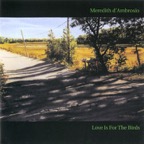 Love Is For The Birds
Love Is For The BirdsSSC 1101
All About Jazz.Com
Jazz Reviews
by David Nathan
August 3, 2002
If the course of time is a major factor in determining the success and long term popularity of an entertainer, then vocalist Meredith d'Ambrosio has graduated Summa Cum Laude. "Love Is For The Birds" is the singer's 14th CD [15th album]. Yet her first recording was for an outfit called Spring, cut in 1978, more than 24 years ago. She is at a point of her career when she can be exceedingly discerning in picking the contents of her play list (even in her teeth-cutting days, she did not engage in that knee jerk reaction of relying solely on standards for her material). With each succeeding release, the play list becomes more varied in style and content, more cosmopolitan and perhaps more obscure in the sense of being secluded. With her latest, she makes a major shift going from songs written by others to an agenda of her works written by herself, with others, or her lyrics added to classics written by consumate artists such as Harold Land and Kenny Dorham. Dorham, always undervalued as a writer, is responsible for one of the most engaging tracks on the album "Rhyme Of Spring" ("Poetic Spring") with words added and airily sung by d'Ambrosio. This track also features outstanding trading of ideas between Don Sickler and Bob Kindred on trumpet and tenor respectively with bass interlude by the ubiquitous Jay Leonhart. Another feature of d'Ambrosio's albums is the close rapport between her and her band and how the latter sustains the mood of the former. . . The session is not all melancholy by any means. d'Ambrosio puts on her swinging shoes for such cuts as "Cup Of Life" ("Cup Bearers"), again with some outstanding ensemble and solo work by the members of the band. The critical task of piano accompanist has been assigned to Lee Musiker and with excellent results. Musiker, who has backed Barbara Cook, Susannah McCorkle and Mark Murphy, is right at home here. Another very good effort by a true artist of the vocal craft. Recommended. . .
Jazzreview.com
by Donna Kimura
August 2002
After [14] albums to her name, Meredith d'Ambrosio has released her first CD made up entirely of her own material. She wrote all the lyrics as well as music for more than half of the 13 songs on "Love Is For The Birds". On the numbers that don't feature her music, she penned stories for songs by Clifford Brown, Kenny Dorham, Harold Land and others. The result is a warm, captivation CD filled with meditations of love. For the most part, the songs swing gently with the musicians setting the pace and d'Ambrosio's soft, lullaby voice setting the mood. She, however, doesn't dominate. Instead, she uses her voice as one instrument in an ensemble. The other musicians all have opportunities to shine. They skillfully create a rich texture behind d'Ambrosio's shy, thoughtful vocals. A Renaissance woman, d'Ambrosio is also a talented painter. Check out the cover art. In some ways, "Love Is For The Birds" is a painting with the musicians, particularly pianist Lee Musiker, contributing splashes of color where needed to create an overall impression. . . Clifford Brown fans will be interested in the light touches she gives to his "Daahoud". "Love Is For The Birds" is recommended.
All Music Guide
by Judith Schlesinger
June 16, 2002
In a sea of sound-alike female vocalists, Meredith d'Ambrosio has always stood alone. Soft-voiced and understated, a writer of literate, thoughtful lyrics, she seems more interested in the overall mood of the music than in showcasing her own emotions or technique. Recording steadily since 1978, primarily for Sunnyside, d'Ambrosio always assembles top-flight musicians to help create her signature feel of meditative intimacy. This new release continues that tradition, with the difference that d'Ambrosio supplies the words and/or music for every track. Six are her originals - "Steppenwolf" and "Valentine" being highlights - and she glides her subtle sentiments over melodies by Harold Land, Clifford Brown, Kenny Dorham, Tom McIntosh, and Eddie Higgins. The band is stellar: many tracks feature a trio setting with the underfamous pianist Lee Musiker, who's constantly wonderful here, the elegant bassist Jay Leonhart and the brilliant Joe Ascione on drums, who, given the calm pace throughout, only gets to break out on the opener and "Daahoud", where d'Ambrosio's ability to swing is also most evident. There are splendid solos by Bob Kindred on sax, John Allred on trombone, and Don Sickler on trumpet and flugelhorn. Sickler also did the fine sextet arrangements. The set ends with a gentle tribute to the peerless singer/composer/pianists Dave Frishberg and Bob Dorough. Overall, a dreamy and relaxing CD.
All Music Guide
by Ken Dryden
August 2002
Singer Meredith d'Ambrosio alternates between trio arrangements (whichch she co-arranged with pianist Lee Musiker) and a sextet scored by trumpeter and flugelhornist Don Sickler, while also writing lyrics for all 13 songs which are centered around the challenge of achieving and maintaining love. Her soft, cool-toned vocals are captivation, as is her ability to write intelligent lyrics that originate from songs by composers like Kenny Dorham, Harold Land, Tom McIntosh, and Clifford Brown. d'Ambrosio also wrote the music and lyrics to seven of the selections, including a haunting ballad "I May Be The One". She collaborated with Eddie Higgins on the richly textured samba "Just A Dream" and Ray Passman on the whimsical but understated "Frishberg And Dorough", a fine tribute to two very entertaining singing pianists which intermixes excerpts of lyrics [and melodies, ed.]from each of the songs. Highly recommended. Four stars
JazzTimes
VOX
by Christopher Loudon
October 2002
I've always considered Meredith d'Ambrosio an acquired taste. . . But once you fall, you fall hard, and I've long since been enchanted by the particular brand of vodoo that she does so well. Love Is For The Birds is a deftly shaded examination of love's ephemerality. . .
Among the entirely self-penned selections, "Valentine" is particularly cunning. Created by d'Ambrosio as a musical response to audiences' endless requests for "My Funny Valentine", it is a Daliesque kaleidoscope of emotions that is spookily sublime. As always, the multi-talented d'Ambrosio is also responsible for the eminently apt watercolor that graces the album's cover - a lonely country road caught, like fading love, between the warmth of summer and the chill of early autumn.
Jazzscene (Portland, OR)
by George Fendel
September 2002
Each new Meredith CD gives reason to celebrate, and this one's certainly no exception. Meredith finds herself in the company of some genuine New York phenoms in Don Sickler, trumpet and flugelhorn; John Allred, trombone; Bob Kindred, tenor sax and drums; Lee Musiker, piano; Jay Leonhart, bass; and Joe Ascione, drums. The tunes are primarily those of the singer herself, and she writes haunting melodies and literate, often romantic lyrics. Most of the tunes deal in one way or another with love and/or relationships, and Meredith never falters in telling the stories spun by these lovely songs. In addition to her well-woven originals, she puts thoughtful lyrics to melodies by such luminaries as Tom McIntosh, Harold Land, Kenny Dorham, Ralph Moore, Clifford Brown and even hubby pianist Eddie Higgins. An extra special treat is Meredith's homage to two of her favorites, Dave Frishberg and Bob Dorough. It's simply entitled Frishberg and Dorough. Listen to it. You'll hear lots of love. And nobody sings of that timele ss emotion better than Meredith d'Ambrosio. Five stars
WDNA 88 Jazz Place
Mel's Picks
"Melodious Mel Loves Meredith. Love may be for the birds, but the latest from Meredith d'Ambrosio is for the jazz lover in all."
by Mel Lipton
September 16, 2002
This is Meredith d'Ambrosio's 14th CD. The multitalented jazz vocalist, arranger and composer wrote all the love song lyrics, and music on half of them. . . "Josephine", the Ralph Moore classic, is transformed into an explicit love ballad entitled "Don't Go". . . Creative is the word for this hip master of the genre. She has sung in front of the best musicians, and this group is no exception. Lee Musiker on piano, Jay Leonhart on bass, and Joe Ascione on drums make up the great rhythm section. To round out this great sextet we have Don Sickler on trumpet and flugelhorn, John Allred on trombone, and Bob Kindred on tenor sax and flute. And talk about talent! All of Meredith's CD covers are her paintings, and this one depicts the road to her summer home on Cape Cod which she shares with her husband Eddie Higgins and a chocolate labrador retriever named Clifford Brown. Quite the jazz family. Don't miss this one.
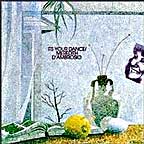 It's Your Dance
It's Your Dance(SSC 1011)
Washington Post (DC)
"Sounds"
by Mike Joyce
October 4, 1985
Meredith d'Ambrosio can always be counted on to pack her albums with splendid song, and her new release, "It's Your Dance" is no exception. The album is bursting at the seams with warm, wonderful, intelligent songs from the likes of Jerome Kern, Vernon Duke, Bob Dorough and Dave Frishberg. The list goes on to include d'Ambrosio herself, which have a gentle, persuasive charm and clearly rank among the album's highlights. . .
Cash Box
December 14, 1985
The wonderful Meredith d'Ambrosio's singing is personal, intimate, and oh so poignant, and she has the knack for picking out the right songs. This is a mixture of rarely heard pieces by the great American songwriters, contemporary pieces that fit the menu, and originals. Fine backing, too, by the cozy pairing of Harold Danko and Kevin Eubanks on half the LP, and the singer on piano the rest of the way.
Chicago Weekend
"Consumer Guide To Jazz"
by Lofton Emenari
March 3 - 8, 1987
Where has this absolutely brilliant jazz singer been? . . . d'Ambrosio is a songstress with striking ability and an unforced beauty. Obscure songs like "The Underdog" and "Humpty Dumpty Heart" are rendered with a smooth edge and grace. Her distinctive manner - a cool, suave breeziness and a mellow soulful attitude - makes this album a heartfelt date of warm honesty. 5 stars
Jazzscene
"Record Reviews"
by Mark Daterman
January 1986
Now here's a very good record indeed: a tight, sensitive trio that can relax and breathe as one unit, with all the right nuances wrung out of them by d'Ambrosio and her clear voice. . . one of the best mainstream jazz records I've heard this year . . .
Cadence Magazine
by Alan Bargebuhr
May 1986
. . . d'Ambrosio's subtle readings of these excellent songs, the unobtrusive but puissant support she receives from Danko and Eubanks, the evidence of her songwriting talents, all underscore the many delights and surprises you'll encounter as you audition this LP. Here is an artist whose honesty of mind and heart complement one another to produce something far greater than the sum of its parts. This one shouldn't be overlooked. It's a beauty.
Willamette Week
"Music"
by Lyn Darroch
May 15-21, 1986
There's an ironic edge to this Eugene-based singer's sweet, subdued voice. Coupled with her original tunes and some well-chosen, offbeat classics, the effect is an intimately poignant and
very musical commentary on life and love. . .
The Register-Guard, Eugene, OR
"Singer goes for wry, romantic jazz"
by Karen DuPriest
May 8, 1986
. . . Her favorite songs by famous composers are the ones hardly anyone knows. d'Ambrosio has found and revived fine songs by G. Gershwin, J. Kern, A. Wilder and others. In "Humpty Dumpty Heart", just such a song by Van Heusen and Burke , d'Ambrosio with her piano seems to play for a single person; you can almost feel the eye contact as she asks, "Who's giving that line to you? You think it's divine, don't you?" Yes, Meredith, it's divine.
Minnesota Monthly
(Author unknown)
April 1986
Meredith d'Ambrosio is a very different kind of singer - understated, conversational, sultry. Her smoky, knowing voice and adept piano stylings are heard to great advantage on "It's Your Dance". . . You get seven songs a side, and none of them are fragments. Many are diamonds. The lady's taste in tunes is exquisite. She covers dry, urbane wits like Bob Dorough and Dave Frishberg, adds lyrics to classic compositions of John Coltrane and Dave Brubeck, and forages for neglected gems from the Great American Songbok about as well as anyone working a club or concert hall. . . The mood is bittersweet throughout. d'Ambrosio presents a collection of badly bent yet hopeful characters in her songs, people with gleams in their eyes and one foot in mud puddles: frustrated sports fans, dismissed lovers, long-in-the-tooth models, and - in the Kern oddity "Nobody Else But Me" - a couple who are drawn together when they realize they're both dull. "It's Your Dance" steers clear of the usual chamber jazz and cabaret fare - no standards, no Sondheim - and the LP is all the better for the omission.
Arts & Entertainment Journal
"A Songwriter's Singer"
by Larry Etscovitz
March 21-27. 1986
. . . Now I've found someone new to cut through the noise in my life. I spent last Sunday afternoon listening to all four of her albums and reflecting on her artistry. Her name is Meredith d'Ambrosio. . .For me, the most important quality of her singing is the tremendous significance she conveys with the lyrics. I found myself getting up frequently to look at the record label to see who wrote that song, and that other one, and I began to reflect upon the treasure-trove of art contained in the American popular songs of this century; not only those by famous names, but also lesser-known but equally great names. The fact that I was thinking about the music and lyrics of these songwriters made me realize that Meredith d'Ambrosio's artistry was making them important to me. Her way with these songs is intimate, personal, as if she was singing just to you. . .
Grammy Pulse
"Looking for a few good discs?"
by Mike Farrace
May 1986
d'Ambrosio couldn't have been named more appropriately. This record is Ambrosia. It's a soft, cool, flowing record oozing with Coltrane and breathy Miles. Pianist Harold Danko and guitarist Kevin Eubanks have combined with d'Ambrosio's fluid pipes for a result that I can ony ineptly describe by saying it's soothing and challenging, vigorous and relaxing. There are a lot of mellow vocal records out there that could easily be recommended, but this one is a must-have.
Billboard
"Recommended"
by Sam Sutherland
December 28. 1985
Fine jazz vocalist with a light, warm touch . . .
Jazz Journal International (UK)
by Simon Adams
January 1986
d'Ambrosio's voice is well suited to the material on this album. . . her statements are necessarily precise and unadorned. She eschews the usual scat traits of most jazz singers and concentrates on clean enunciation of words and notes, her voice clear in the middle register, huskier at the extremes and never forced. Many of the lyrics are her own, love and disillusionment the usual topic, . . . hers is an individual voice of great charm and interesting tonal coloration. . .
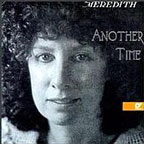 Another Time
Another Time(SSC 1017)
The News and Observer, Raleigh, N. C.
by Owen Cordle
August 30, 1981
. . . Meredith is an intimate charmer. . . Her low-pitched voice has the airy grace of Stan Getz's tenor sax, her sparse piano shadows Bill Evans, and her repertoire celebrates the well-turned phrase. . .
Stereo Review
by Chris Albertson
October 1981
. . .Meredith's new Shiah release, "Another Time" is her second album. Like her first, it appears on a small, private label of the kind whose releases usually end up, for lack of adequate promotion and distribution, stacked in somebody's closet or basement. That would be a real shame in this case, for "Another Time" offers connoisseurs fine versions of 18 songs by 23 writers. . . I can enthusiastically recommend both [albums] to anyone interested in the arts of songwriting and song delivery.
Newport This Week
by Charles Drago
November 13, 1981
. . .There never has been a warmer singer than Meredith d'Ambrosio, one who can so selectively conjure the good memories, the grey and yellow light of an autumn shower, the musty smell of Christmas ornaments resurrected for another seasonal go-round. "Another Time" is a masteriece of romance and resolution, a collection of 18 gems spread across the darkly hued velvet of Meredith's vision. . . this set offers thematically and emotionally direct statements, as pristine in their conciseness as a short story by Barthelme. . . Indeed, she retains an unwillingness to waste time, a need for immediate verities as she effortlessly reaches the very heart of each song. Alec Wilder, to whom "Another Time" is dedicated, must have written "While We're Young" for Meredith. She administers the tender admonition of its lyric while illuminating a subtext both subtle and profound. . . Throughout "Another Time", Meredith is buoyed by her own piano accompaniment. Always jazz-true, open neither to the repetitive-but-swinging n or inventive-but-flat canards, her playing remains subtlely propulsive, harmonically sure and, especially in those short and sweet introductions, melodically uplifting. . .
Jazzletter
by Gene Lees
November 15, 1981
. . . Meredith is a startling singer, not because of spectacular fort high notes or ingenious explorations of the harmony, but for her utter self-efacing simplicity, her devotion to the honest presentation of the song. Miss d'Ambrosio is a pianist, and a good one. She is her sole accompanist on the record, and she is (like Blossom Dearie) perfect for herself, with a lovely touch and tone and voicings (which occasionally hint atone of her heroes, Bill Evans) that are inelligent, discreet, and pretty. And she is always the servant of the song. Her intonation and enunciation are impeccable. . . She uses vibrato only occasionally, and then it is very controlled in speed and width. Her way of aroaching intervals is a delight. Down-up, bing! Right on the note. No sliding into place, no uncertainty about the center of the tone. It's like watching a bird as it alights on t fragile branch without even shaking it. There is an immediate temptation to compare her to Jackie Cain and the late Irene Kral, but in point of fact she has only one quality in common with them: perfection. Otherwise, she is - as they are - her own woman. . . there is a quality to this album (whose reputation is gradually spreading, by the way, entirely on its merits) that I can only describe as...serenity. . .
Crescendo International, London
by Jimmy Staples
January 1982
. . . Meredith d'Ambrosio is that rarity - a sincere and completely uncommercial singer. . . has an intimate voice, full of feeling, and her choice of titles is exquisite! . . .
American Federation of Music "On the Leval"
by George Leval.
March 10, 1982
. . .The great philosophers of our day are those singer-pianists who see truth through the haze of cigarette smoke and lost dreams. Miss d'Ambrosio approaches her material with great affection. Her pacing, attention to detail and clarity never falter. She is a jazz-oriented singer and a skilled piianist who never allows the piano to intrude on her conversation with her listener. Her voice is a warm, husky, fully-textured instrument; remarkable for its breath control. . . Meredith is an original. One is impressed by the repeated surprises, the joys she evokes by repeated listening. There is always subtlety and nuance in her work. . . a remarkable second album.
Washington Post
by Mike Joyce
November 12, 1982
Meredith d'Ambrosio, long a familiar name in Boston, is no ordinary B-flat singer, as Dave Frishberg might have said. Her husky, low-keyed singing complements a taste for songs both lierate and lasting. . .
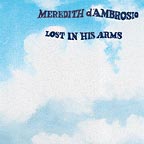 Lost In His Arms
Lost In His Arms (SSC 1018)
New England Today
by Fred Bouchard
1980 Nov./Dec.
Meredith d'Ambrosio has been skimming as gracefully as a tern between careers as a singer/pianist and eggshell-mosaicist for many years; she is finally coming home to roost with the former art, and lovers of American song can rejoice. . .M. brings the same fine-etched, delicate emphasis and pastel shading to the songs as she does to her land- and city-scapes. . . Every tune Meredith sings sounds fresh and new each time she sings it because she makes herself the vehicle of the message, the Sibyl of the composer and lyricist. . .
Cadence (Point-Counterpoint)
by Bob Rusch
1981 March
. . . Tune collectors will welcome this for its fine choice of first line, but obscure gems: when was the last time you heard George Handy's, "Rip Van Winkle" sung? Ms. d'Ambrosio also shows a talent as a lyricist as she naturally integrates her own original lyrics to Freddie Hubbard's "Up Jumped Spring". . . Best of all, the spirit and performance of the record holds up very well. It remains fresh and inviting after dozens of listenings over dozens of days. . . A secret worth publicizing and worth your attention. A very fine record, strongly recommended.
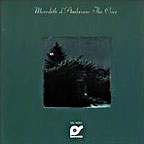 The Cove
The Cove (SSC 1028)
The Charlotte Observer
"Meredith d'Ambrosio album worth looking for"
by Jerry Shinn
. . .the star is d'Ambrosio, a graphic as well as musical artist. (One of her watercolors graces the album cover). . . she's a fine singer with a distinctive voice and a sexy, sophisticated style. In addition to painting the cover and singing, she accompanies herself on piano on three of the selections and, along with Hersch, provided the arrangements. She also wrote two of the songs: "Thunderstruck", with clever words and unpredictable music, and "Time To Say Goodbye", with poignant sentiments matched to an equally poignant melody. . .
Cash Box
October 15, 1988
One of the tastiest vocalists going in a purring, romantic album of standards and should-be-standards with Lee Konitz on hand.
The Dallas Morning News
"A Surge Of Jazz Releases"
by Doug Ramsey
January 15, 1989
Possibly the least famous great singer alive, d'Ambrosio implies more in a phrase than a pop-jazz sensation like Diane Schurr shouts in an entire album. Here, with a perfect rhythm section headed by pianist Fred Hersch and occasional obligatos and solos by alto saxophonist Lee Konitz, she uses her musicianship, jazz sensibility and sensuous dusky voice to recast 15 songs. . . All are explored for depths and levels of meaning that can be discovered only by a major artist.
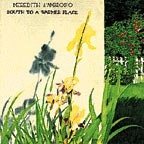 South To A Warmer Place
South To A Warmer Place(SSC 1039)
Jazz Times
by Doug Ramsey
May 1990
Through its use by record industry flacks to describe every new rapper, three-chord guitarist or teenager screaming descriptions of the sex act, the word "artist" as applied to music has been, shall we say, devalued. In an earlier phase of its evolution it meant a person who used aesthetic principles to produce something beautiful, appealing and extraordinary. Meredith dAmbrosio is an artist in the pre-merchandising sense. Intelligence. Taste. Restraint. Subtlety. Insinuation. Harmonic sensibility. Voice production that seems effortless. Purity of intonation. Flawless diction, timing and phrasing. These are the aesthetic principles employed by Ms. d'Ambrosio in her wizardry of interpretation. When she merely sings the melody, which is often the case, she finds depths of meaning that can be discovered only by a true artist. . . This singer's work is full of small, brilliant joys and surprises. . . At the end of "More Than You Know", she invents a harmonic sequence worthy of Dizzy at his slyest. Ms. d'Ambrosio's vibrato is used as sparingly as her harmonic knowledge, never for show, only when it somehow advances the music, as in her phrase endings in Clare Fischer's "Morning". There are, in this album, dozens of such examples of her musicianship. But what will strike the unanalytical listener is the sheer, natural beauty of the singing...
Downbeat
by Fred Bouchard
July 1990
Meredith d'Ambrosio is like lavender: traditional, fragrant, and durable. Her constant affection for America's more subtle and unsung pop tunes os finally paying off: this could be the cool, clear-eyed semi-discovered singer's best yet . . . Five stars
Journal Of The International Assoc.
of Jazz Record Collectors
by Art Hilgart
Summer 1994
This review is personal dues. When we get a new record, we play it a few times, maybe make a tape for the car, enter it in our computer files, and shelve it in alphabetical order. But "South To A Warmer Place" just can't make it off our new record shelf. To pick it up is to play it one more time. d'Ambrosio and Higgins bring perfect jazz chops to songs, but wonder of wonders, the meaning of the lyric is redered flawlessly as well. . . And now, if you'll excuse me, I have to go play it again.
Wire (London, Eng.)
by Graham Lock
November 1990
The new "South To A Warmer Place" is the minor masterpiece Meredith d'Ambrosio has been promising for a decade. At last, all the elements fall into place: she's picked a set of five-star standards, with barely a too-cute line in earshot, and assembled a sensitive small group of accompanists, among whom Eddie Higgins stands out as the perfect foil for d'Ambrosio's low, lugubriously-swinging vocals. The results are enchanting: a display of top-class jazz singing, intimate in style, subtle in execution, and with no unwanted distractions to make you cringe. . .
The Ottawa Citizen (Canada)
"Jazz"
by Lois Moody
July 13, 1991
Don't let the soft, low-pitched voice and deceptively simple delivery of the singer keep you from paying close attention to what is really happening in this performance. d'Ambrosio is a subtle, thoughtful interpreter, a creative lyricist and improviser and a wel-rounded musician. She is one of those rare individuals who can make you focus totally on a song and perhaps change your way of listening. . . Highly recommended.
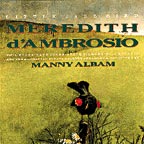 Little Jazz Bird
Little Jazz Bird(SSC 1040)
Newport: This Week
"The Little Jazz Bird Soars"
by Charles Drago
December 23, 1982
. . .STOP THE PRESSES! "Little Jazz Bird" is not merely a showcase for the considerable talents of singer/pianist Meredith d'Ambrosio, in its celebration of the standard repertoire, presentation of new songwriting talent, redefining of the state-of-the-art of vocal/jazz insrumental interaction, and reintroduction of one of American music's most gifted arrangers, this recording sets a host of standards that serious practitioners of these arts will be hard pressed to meet. . . Darkly humorous, intentionally chilling and ultimately this record's crowning glory, "When The End Comes" is haunting the way no other song in the history of this music can be . . . This in a soft ballad tempo as Phil Woods's alto rumbles faintly, faintly and is gone. So we have come to this, our imaginations bowed under that terrible weight. If for a moment I believed that "When The End Comes" was a document of surrender, an acquiescence to the evil that would deny the love and sadness and life of which Meredith so beautifully s ings, then I would damn this record and all it represents. But Deborah Henson-conant, in that ultimate melancholy she so outrageously understates, make as significant and eloquent a statement on behalf of humanity as those of Jonathan Schell and E.P. Thompson and Alec Wilder and Horace Silver. And Meredith d'Ambrosio whom I love.
Philadelphia Daily News
JAZZ
"Sarah Vaughan/Meredith d'Ambrosio"
by Nels Nelson
January 7, 1983
. . . I simply can't say enough about her. Here is a singer and musician who knows her own voice in a way that the best solists in jazz know their instruments . . .
San Francisco Bay Guardian
"'83's Hot Discs"
by Derk Richardson
March 23, 1983
. . . Everything about this delicious little album is graced by a lightness of touch. . . Above it all wafts d'Ambrosio's exquisitely warm, sincere and focused voice, one of the most inviting and comforting new sounds in jazz. . . Without ever resorting to pathos, she touches deeply. And the entire production fits like a down comforter.
Jazz Times Record Reviews
by W. Royal Stokes
August 1983
. . . This is an album deserving wide listening by both those who love a lyric lightly handled as well as those for whom jazz singing only means reviving up the tempo until the radiator boils over. d'Ambrosio may be described as the alter ego to her vocal hot breath of her intimate way with the poetry of jazz. . . she accompanies herself on two numbers with a pianistic identy that can only be described as the alter ego to her vocal attributes. This could be the sleeper vocal album of the year.
IAJRC (International Assoc. of Jazz Record Collectors)
London, England "Record Talk"
by John Lindner
January 1984
. . .none of the overworked standards here. There is a special magic in Meredith's voice, and how often can you say that about anybody? Her's is the kind of voice that you might find in a small, intimate, smoke filled night club, while you sit at the piano bar savoring every little nuance and note, thinking perhaps of old love affairs, while you consume innumerable glasses of your favorite libation.
Jazz Journal International London, Eng.
"Record Reviews"
by Derrick Stewart-Baxter
March 1984
This is a delightful record full of god songs, good playing and of course, excellent singing . . . All the songs are delightful and many will be unknown to most readers. To sum up - a record containing fine songs, good arranging and a sensitive singer. Who dares ask for more?!
The Singles Forum Denver, CO
"For The Record"
by Dawn Heather Simmons
September 1984
Up until about two weeks ago, there were two jazz artists I felt were deserving of far more recognition than they were getting in the Denver area . . . Bob Dorough and Blossom Dearie . . . Now there are three . . . I welcome into those ranks Meredith d'Ambrosio, whose latest release, "Little Jazz Bird", is destined for excessive playing on my turntable for as long as the grooves hold out. . . Her phrasing is without fault, her pitch is perfect, her tonal quality is rich and warm, but most of all, her voice is intimate. . . In the last couple of years, she has won great critical acclaim. . . The album is exquisite. . . Just lsten to this music and wrap it around yourself like a warm blanket on the first chill evening of fall. And if you're still not convinced, you might take this to heart: Recorded music is nice, but nothing compares to live performance. Meredith will be performing live at El Chapultepec on Sept. 2 and 3. Don't miss her!
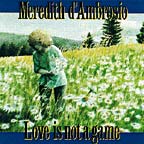 Love Is Not A Game
Love Is Not A Game(SSC 1051)
Lawrence Journal World
"Jazz"
by Chuck Berg
September 8, 1991
Meredith d'Ambrosio, a consummate storyteller, is a true musician whose graceful phrasing, rhythmic subtlety and impeccable taste put her in company with the best of improvising instrumentalists. For a taste of her skills in spontaneous composition, try her uptempo romp through the medley of the Cole Porter classic "I Love You" and d'Ambrosio's own clever spin-off "You I Love". Indeed, it's not surprising that the singer is herself a fine pianist whose sensitive playing is displayed here on the title track, a brooding lament called "Love Is Not A Game". . . d'Ambrosio, in addition to her own compositions, is a talented wordsmith who's penned attractive lyrics for such well-known jazz lines as J.J.Johnson's "Lament". . . In all, an impressive date from one of jazzdom's most exotic larks.
Jazz Times
by Fred Bouchard
November 1991
And finally - aah - Meredith. What a breath of fresh air she breathes into this subtle and sumptuous set! . . . Ms. d' sounds sunnier, younger, and more smiling that she has in her last two albums - a warm quaver with a thrill in it, Blossom Dearie down an octave. And with her watercolor self-portrait picking daisies on the cover, you say to yourself: "Sunnyside, indeed!" She never ever forces, either her dusky voice or an idea. She knows the limits of her range and her emotions, and squeezes us their first pressings. . .
Washington Post/Weekend
"On The Town"
by Mike Joyce
September 20, 1991
A watercolor self-portrait adorns the cover of singer (and artist) Meredith d'Ambrosio's new album "Love Is Not A Game", a fitting touch for a recording as intimate and revealing as this one. Intimate, because d'Ambrosio and her trio takes great care in arranging her material sensitively to underscore the emotion implicit in each lyric. Revealing, because as both a singer and a composer, d'Ambrosio continues to interpret and write songs that have a distinctly personal, sometimes even confessional slant. A singer, after all, should make you a believer, and here, whether unveiling her own often contemplative songs, or adding wonderful lyrics to tunes by J.J.Johnson, or interpreting Bill Evans's lovely ballad "In April", d'Ambrosio makes it all look easy and effortless, despite the often challenging arrangements. In short, she's part poet, part improviser and wholly convincing on this recording . . .
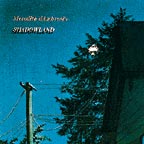 Shadowland
Shadowland(SSC 1060)
Durham Morning Herald, N.C.
by R.C. Smith
May 21, 1993
. . . Her CD for Sunnyside, "Shadowland", may actually be a watershed album for jazz singing, as it contains several "paraphrase" songs, which involve her creating jazz variations on the lyrics as well as the melodies. . . as usual this singer's song selection is splendid. . .
JazzTimes
by Fred Bouchard
July/August 1994
Meredith d'Ambrosio - a steadily evolving singer with a pure voice and a gentle heart - has done something nobody else has done before: she's combined her (initially) improvised melody and written new lyrics to fit her improvisation, gently extending the standards. She calls them "paraphrase songs" and she works them seamlessly and respectfully into the fabric of the originals. . . These feats of selfless, cautious craftsmanship all expatiate - in witty. winning, beatifically beboppish melodizing - on Meredith's patented little-girl-with-stars-in-her-eyes-view of Love. . . High marks for Meredith's elegant, understated performances; higher still for her precious brain children.
IAJRC Journal
by Art Hilgart
Fall 1993
Admirers of fine songs who have an equal taste for jazz usually have to settle for one or the other - a good jazz treatment or a sensitive interpretation of the song as written. No such compromise is required by the singing of Meredith d'Ambrosio. Her delivery of the words and music are such that the song reaches our ears directly from the composer's intention. . . "Shadowland" is an excellent inroduction to Ms. d'Ambrosio. Her selection of standards - some not widely heard - is always exquisite. Her own compositions are of a piece with them and her lyrics are those of a master craftsman. The title song is a haunting combination of her words and Dave McKenna's music. The arrangements and piano on the disc are by her husband, the protean Eddie Higgins, and violinist John Frigo is an inspired addition to the pair. Woodwinds bring an unobrusive ambience to several of the songs. . .
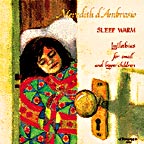 Sleep Warm
Sleep Warm (SSC 1063)
France Inter (radio)
after playing "Lullaby Of The Leaves"
by jazz announcer Julien Delli Fiori
2006
"Do you know a more delicate vocalist-pianist? She wears a crown made of stars and falling asleep at her side must be heaven."
Boston Globe
by Bob Blumenthal
"Subtlety and taste: a rare jazz genre"
June 23, 1994
Jazz vocalists need not shout when they swing, or scat like mad hatters, or immerse themselves in the no-good-lover blues. There are also singers of subtlety and introspection, of tasteful musicianship and quiet wit. Shirley Horn is perhaps the ranking member of this group, and Meredith d'Ambrosio, who plays piano as well as sings, is another most worthy representative of the genre. The Sunnyside label, which has extensively chronicled d'Ambrosio's work, just released one of her best, Sleep Warm, a solo project accurately described as "lullabies for small and bigger children". d'Ambrosio can also sing for grownups, as she will demonstrate at Scullers tonight, where the piano duty will be turned over to her husband, the estimable Eddie Higgins, and where the musical guest list includes trumpeter Lou Columbo, bassist Peter Kontrimas and drummer Alan Dawson.
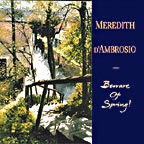 Beware Of Spring!
Beware Of Spring!(SSC 1069)
Jazzscene (Portland, Or)
"d'Ambrosio is a true jazz artist"
by George Fendel
May 1996
Meredith d'Ambrosio should be employed in a thousand music clinics all over the country to demonstrate to screechy pop singers just what real singing is all about. She just does it all: sings, plays piano, writes attractive melodies and lyrics for adults, and rewrites standards with new lyrics in a most creative manner. On this CD, she weaves her impeccable magic, trading piano chores with her husband Eddie Higgins and the rest of his trio, George Mraz, bass, and Jeff Hirschfirld, drums. Instead of going through a long list of tunes, let's just say that this is a literate album of the familiar and the stirringly new. In particular, Beware Of Spring and No One Knows, both written by Meredith, are poetic and powerful. Some singers are best termed entertainers. I say with conviction that Meredith d'Ambrosio is best termed artist. Five stars
The Music Advocate
by JSP
February 1996
I fell for Meredith d'Ambrosio's sublime voice when I first heard Little Jazz Bird . By the time she released Shadowland I was a fool madly in love with her understated elegance and uncanny sense of material. . . Not one to dazzle listeners with vocal gymnastics, Ms. d'Ambrosio tenderly unveils the heart of each lyric. Two coments culled from the liner notes that I feel need repeating: first, if this woman sang the phone book I'd buy it and so would anyone familiar with her remarkable melodic insight and pure voice, and perhaps more important, this is a songwriter's singer. . . For fans of that wondrous jazz instrument we call the voice this phenomenally recorded disc is a must own. . .
Diapason (Paris, FR)
by Alain Gerber
March 1996
( translated from French)
Meredith d'Ambrosio perhaps would not have had the curiosity, the ambition, or the nerve to work to the full extent of her capabilities if not for her producer, François Zalacain, making her feel that while he was completely satisfied with everything she had already done, he did not doubt that she was capable of even more. Nothing succeeds better with an artist than the hopes that we place upon her. One never surpasses anything except when one feels invited (not incited) to do so. Meredith surpasses herself here in several interpretations, to the point where she occupies the place left vacant by Maxine Sullivan, that of the most subtle, the most modest, and the most touching of singers without vibrato. Economic in her ways, playing with a consummate virtuosity of interiorization and perspective, she expresses herself with a justice of tone and delivery exceptional enough to give, paradoxically, a feeling of amazement. And a shiver on top of it all.
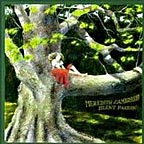 Silent Passion
Silent Passion (SSC 1075)
New York Sheet Music Society
Dan Singer's Singers
By Dan Singer
May 1997
Pianist singer Meredith is almost all alone here. Naked like a tightrope walker, except for guitarist Gene Bertoncini. Each and every feeling and emotion is there for your ears to pick up on just as the microphone did. There is a tinge of Jeri Southern throughout and it's painstakingly so personal, with her unique one of a kind phrasing. Jerome Kern's "Long Ago And Far Away" contains the long ago forgotten verse. Meredith makes you forget all the other versions you've ever heard before. There is a tempo change which chills and mesmerizes the lucky listener. "I Got Lost In His Arms" by Irving Berlin is so complex in it's simplicity. It's another devine experience you will receive when you listen to this CD. Meredith takes a great piano solo here. "All Through The Day" by Kern again is so downright honest in performance. There are wonderful piano and guitar solos. On "The Thrill Is Gone" by Ray Henderson and Lew Brown, there is a hip, lilting , off the beat scatt ending which is yet another joy to behold. For reminders of depression and loneliness, there is "Where Are You" by Jimmy McHugh and Harold Adamson with its verse. Peggy Lee's words for Johnny Mandel's "The Shining Sea" is still ringing in my ears. You are actually placed right there beside her (I hope you can all swim). It's as close as you would ever want to get - a three D effect. This is certainly not a CD you should listen to as background. It is for special ears and just as fine as classic wine to be savored forever. Meredith's superb watercolor graces the cover of this important release.
JazzTimes
By Patricia Myers
September 1997
Meredith D'Ambrosio
Silent Passion
Sunnyside
Pianist-vocalist Meredith D'Ambrosio spins a wistful web over a dozen love songs, including five of her own. She's longingly languid on Irving Berlin's "I Got Lost in His Arms," tenderly croons "Don't Take Your Love From Me," then segues the chart's changes to double-time for her own "A Skyful of Teardrops." Her sweetly sincere voice is particularly effective with Gene Bertoncini's flawless guitar on "Where Are You?" for this duo album. That she's both musically and verbally clever is evidenced by her original, "Knight in Shining Karma."
 Echo Of A Kiss
Echo Of A Kiss(SSC 1078)
Jazzscene
"Platter Chatter"
by George Fendel
March 1999
Meredith d'Ambrosio will never try to dazzle you with decibels. She most assuredly will, however, seduce you with subtleties and shadings. Her very intimate and personal style is once again documented herein with perfection. With Mike Renzi, piano; Jay Leonhart, bass; and Terry Clarke, drums, Meredith brings us a recital of well chosen standards, jazz gems and originals. She rewrites the melody lines on the chord changes of Beautiful Love and Ghost Of A Chance. She then adds original lyrics, thus, in effect, creating brand new songs. . . And don't miss Ms. d's sensitive renditions of her own material as well. Every M d'A album is something special, artistic and heartfelt. Five stars
Jazzman (Paris, FR)
by Alex Dutilh
March 1999
(translated from French)
Faithful to her producer, François Zalacain; unfaithful to her former accompanists... After an unfaithful period of time where she accompanied herself on piano, the twelfth CD of Meredith d'Ambrosio is well-conceived and well-played. Well-conceived regarding the care in the construction of an album versus the often-forced artifices of the so-called "concept album". Meredith devotes "Echo Of A Kiss" to a simple theme: lost love. In some way it is like hearing the late Paul Desmond playing "Glad To Be Unhappy". But it is the care taken in the creation of this album, in one blow, that causes admiration. It is a movement that glides imperceptively and inexorably from the innocence and youth sung in "When Lights Are Low" toward the pain of the memory buried by time lost. Therefore, as another sign of intelligence, Meredith wisely alternates rhythm and harmonic colors in order not to be darkened by the monochrome of the evaporation of feelings. And, as always, along with "complete" versions, she chooses some original tunes, along with some paraphrase songs based on standards, with her own musical lines and lyrics as in "Beautiful Love" which becomes "Gorgeous Creature". The musical skill can be well-defined by the perfect interplay between her and the piano of Mike Renzi, the acoustic bass of Jay Leonhart, and the drums of Terry Clarke. Those three should really have a long-term association with this singer-lyricist-composer-painter. Here is nothing but nuances, discrete peeking and love-whispers.
Our Town (Portland, OR)
"Jazzmatters"
JAZZ CDs OF THE WEEK
by George Fendel
November 9, 1998
Singer Meredith d'Ambrosio's new CD on Sunnyside, Echo Of A Kiss is another outstanding example of pure, intimate jazz singing at its finest. Meredith explores standards, jazz classics and a few original compositions in her warm, personal, undersated and highly musical style. Don't miss this one.
Jazziz
"Voices"
Essential eccentrics and buried treasures
by Lee Jeske
January 1999
About 20 years ago, the jazz magazine for which I was then writing sent me a stack of LPs by obscure female singers:"Would you review these en masse?" I would. I did. I don't remember most of the singers, but there were two that I fell instantly in love with: Shirley Horn and Meredith, a one-named singer . . .Nearly 20 years
later both record regularly. . . Meredith d'Ambrosio has also been churning out an album every year or so, all of them available on Sunnyside Records. . . if you don't know her, and you like singers who cozy up to you and nestle into your arms, Echo Of A Kiss is a fine place to get acquainted.
JazzTimes
by Doug Ramsey
March 1999
Despite her 12 superb Sunnyside CDs, the wider audience for singers may be unprepared for Ms. d'Ambrosio's musicality and understatement. . . Here is the serious listener's latest opportunity to be drawn into the art of a woman who puts emotion, literacy, and wit into vocal collections of substance and long-term value. The selections in Echo Of A Kiss are typical of her interests, which send her ranging through many eras, many styles and her own creativity. . . She does those songs in tune, in time and intelligently. She interprets them in her lovely bel canto way, achieving the difficult balance between jazz values and the intentions of the songwriters. When Ms. d'Ambrosio is at her best, . . . she is a singer not to be missed.
Jazz Hot
(translation from French)
by Serge Baudot
October 2000
To listen to Meredith d'Ambrosio is to abandon oneself to her charm. Here she does not accompany herself on piano, but leaves this task to a group of mainstream jazz musicians who support her and allow her to give the best of herself. She puts you under a spell with her unreproachable diction in the manner of the great crooners, with a great sense of phrasing, intonation and quiet swing. All the themes, including her own song "I Will Follow Spring" are love songs. She makes us swoon with "Smoke Gets In Your Eyes". Meredith is in the tradition of Helen Merrill - without affectation, showing a natural simplicity and inner lyricism that expresses more than all the high-soaring of scat singers. She is fundamentally a jazz club singer. Her musicians always captivate you with their interpretations and absolute pertinency. We share their joy in their playing. We must allow ourselves to be wrapped up in her deep tender voice like a sweet breeze of a summer evening by the sea, gazing at stars and dreaming of love st ories that will never happen.
Spotlight, Seacoast Arts & Entertainment
(Portsmouth, NH)
by Alan Chase
September 21, 1999
Meredith d'Ambrosio is a gem. A jazz vocalist who is a master of simplicity and understatement. A jazz artist who explores the beauty of the lyrics to a song and renders them in a story-like fashion. She infuses the proper emotion into a song whether it be sadness, humor, or joy, yet she does it in such a wonderfully casual way, almost as if she is an observer, a person on the outside looking in. Her style is very much her own, drawing on the influences of jazz artists like Bill Evans or Miles Davis in terms of how she renders her art. On this recording, d'Ambrosio places her subtle vocal work within the context of the trio of Mike Renzi, Jay Leonhart, and Terry Clkarke. Together, this group performs a mix of originals by d'Ambrosio and some choice standards with stellar results. . . All throughout, her phrasing, time, and feel are impeccable. As is the work of Renzi, Leonhart, and especially Terry Clarke. They all interact wonderfully with Meredith d'Ambrosio as if they have all performed together for year s. Then again, it has been said that great minds think alike. In the case of d'Ambrosio and her colleagues on this recording, that's very true. With terrific results.
Jazz Journal International (UK)
by Bruce Crowther
May 1999
It is quite a while since I heard this delightful singer and I confess I had forgotten just how good she is. Phrasing well and bringing to lyrics care, wit and understanding, she sings with casual, understated charm and elegantly laid-back swing. Her arrangements are simple and designed to showcase the song, not herself, yet somehow this calculated self-effacement does also reveal the artist in all her considerable skill. The songs are a nicely balanced mix; some unhackneyed standards and five originals by the singer, either music or lyrics or both, plus two paraphrases which add to their inspirations. There are also some songs with jazz pedigrees, including Bill Evans's Blue In Green and Time Remembered, Ellington's Black Butterfly, Carter's opener and Thornhill's Snowfall. All these songs are given excellent readings by all concerned because the accompaniment is first rate, the three instrumentalists involved being in-demand session musicians with very respectable jazz chops. . Excellent sound quality, a good note by Lora Rosner and a gatefold pack in the shatterproof plastic I hope will soon become standard round out a nice package the front of which is illustrated, as usual, with d'Ambrosio's work, by one of her own exceptionally attractive watercolours. Recommended.
So What (Paris, FR)
by Bertrand Revalard
December 2000
(Translated from French)
. . . Almost at the end of my mandate in the midst of So What, the secretary brings me a package, not knowing what treasure is inside: The new album of Meredith d'Ambrosio. As usual, the cover is a painting by the diva herself. As usual, she has concocted a judicious mixture of 14 standards, known or completely forgotten, some of her paraphrases and, of course, two or three of her own compositions. As usual, she has written all, or most, of the arrangements, supported by a drummer whose playing is not too invasive. And she has included one or two Bill Evans tunes, accompanied by her new pianist, Mike Renzi, . . . As usual, to avoid the noise next to me of my collegue, Bregeras, who is listening full blast to the last Nils Landgren, I would have to listen to this precious disc with headphones to feel myself close to Meredith's discreet perfume so that nothing will interfere with the power of her delicate voice, and the expressive subtleties which make up her marvelous art.
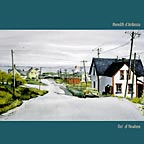 Out Of Nowhere
Out Of Nowhere(SSC 1085)
Down Beat
by Fred Bouchard
September 2000
Blessed with an exquisitely shaded contralto [ed. tenor], droll humors, perpetual youth and an amazingly rich repertoire, d'Ambrosio has carved her niche caressing smart originals ("I Will Follow Spring"), rare Tin Pan Alley gems ("Easy Come Easy Go") and reworked bebop, She brings oodles more experience, yet no less innocence and vulnerability, than Monheit to "My Foolish Heart." She affords each tune a refreshing rethink: Humor surfaces on "On The Bumpy Road To Love" and "Stopping The Clock" with brisk turnarounds and wise support from pianist Lee Musiker. Five stars
Jazzscene (Portland, OR)
Platter Chatter
"d'Ambrosio CD sizzles"
by George Fendel
If we weren't so fortunate to have Meredith d'Ambrosio as one of our premier singers, we'd have to invent her. It's because she brings us such a delicious combination of goodies. Her voice is ideally suited to her material. It's relaxed, understated and hip-as-can-be. But Meredith's secret, one shared by very few singers, is her ability to deliver the meaning of a lyric. And thankfully, she chooses material from the highest tier of what I like to call the Great American Songbook. She mixes the cherished (My Foolish Heart, Smoke Gets In Your Eyes) with lesser known gems (On The Bumpy Road To Love, Easy Come Easy Go, Dance Only with Me, All In Fun). A few tunes merit specific comments. Isn't Thnt The Thing To Do is a gentle Blossom Dearie composition with an endearing lyric. Stoppin' The Clock is a jazzy little number that I haven't heard since Jackie and Roy's version way back on ABC-Paramount Records! Finally, there's I Will Follow Spring, Meredith's own airy and beautiful ballad. Accompaniment here is provided by the under-recognized but brilliant pianist, Lee Musiker, along with Jay Leonhart, bass; Terry Clarke, drums; and, on two tunes, Michael Leonhart, trumpet. And then there's Meredith. To borrow a line from the Wizard Of Oz, "There's only one of 'er and she's it!
Five stars
So What
by Bertrand Ravalard
May 2000
(translated from French)
Don't believe, dear friends, the propaganda by our fellow journalists. The most important jazz singer of today is Meredith d'Ambrosio. Some people have the guts to say it (for example Jean- Pierre Moussaron, know as her staunch admirer for many years). And François Zalacain is our idol, because he has allowed the American singer to record her treasures for the last fifteen years. But we're not concerned by the fact that other people may prefer Diana Krall. (It doesn't matter that her pianist, Lee Musiker, is not as famous as Eddie Higgins or Fred Hersch, her previous accompanists.) Madame d'Ambrosio, with this CD, comes to announce the arrival of spring (by acknowledging the arrival of spring with her marvelous "I Will Follow Spring" superbly poetic and delicately swung). Let's not kid ourselves. You cannot place "Out Of Nowhere" in May 2000. It is out of time. More precisely between the forties and spring.
JazzTimes
Before & After
by Doug Ramsey
(interviewing Dee Dee Bridgewater
about the song, "All In Fun")
April 2001
BEFORE: Nice piano intro. Oh, she's telling a story. I'm all into this story that she's telling. That's the difference between a young singer and a mature singer. She improved on the song. She kind of has that Chet Baker phrasing. I don't know who it is.
AFTER: I've never heard her. She's fantastic. I was grooving. I love the timbre of her voice. It's kind of like a flugelhorn. She takes her time. It was swinging. Very good arrangement. She's got a nice style. I'll have to get her album. Five stars
General Reviews
GRAND HOTEL #101
(Radio broadcast from Argentina)
by Pablo Avelluto
June 18, 2000
(translation)
. . . Today I want to present Meredith d'Ambrosio. I have been listening to her for one month, and my fascination with her is total and absolute. And, to date, there is no one to equal her. Meredith is an exceptional singer, pianist, writer, composer, and if this isn't enough, a great painter. Her paintings have been exhibited in important galleries and museums in the USA [and abroad]. Some say that she is a Renaissance woman of the times. I believe this is true. I have recently discovered her, and I dedicate myself to compulsively seeking her discs. With this enthusiasm I want to share them from the Grand Hotel. We begin with a classic disc, South To A Warmer Place : "More Than You Know" and "The Touch Of Your Lips" with a giant, Eddie Higgins on piano. From Another Time 1981: "Aren't You Glad You're You" and "Some Day My Prince Will Come" (remember Blancanieves? [(Snow White)]) with Meredith alone on piano. Coltrane was fascinated with her voice and asked her to come to Japan to sing with his group in 1963. Hence the album It's Your Dance (1985): "Giant Steps" is on this disc [d'Ambrosio's lyric]. Then comes "Nobody Else But Me", with Harold Danko on piano and Kevin Eubanks on guitar, Meredith on piano also. From the album Silent Passion (1996) comes "The Thrill Is Gone" and "Where Are You" (one of my favorite songs) with Meredith on piano and Gene Beronncini on acoustic guitar. On Shadowland, a formation of shadows with Eddie Higgins arranger and pianist, with bass, drums, cello, violin, English horn, bass clarienet, flute and oboe: "A Rainy Afternoon", an incomparable "Fools Rush In" by Johnny Mercer/Rube Bloom, and Meredith's paraphrase song based on this song "This Rushin' Fool" (1992). Sleep Warm (1991) is a disc of lullabies for adults: "Hit The Road To Dreamland", "Lullaby Of The Leaves" and "Sleep Warm" one of my favorites on a cold night.
Jazz Magazine
Paris, France
1998
Meredith d'Ambrosio: Une passion Silencieuse
by Bertrand Ravalard
translated from French by Eddy Pay
For those who, like me, consider music, regardless of its color or origin, as something one must cherish and never give up in capturing its joys and pains, it is difficult to consider the current multitude of jazz singers and their likes as truly assimilated, jovial, and without culture (nor a desire for culture). The fact that certain jazz women take advantage of this speaks for itself.
Little does it matter and I'm not suggesting that even So What (magazine) which still has not made a war machine of a cold dynamic monster. Meredith d'Ambrosio, as you may have noted, is not a star which an adjective in a form of an accepted lie can propel to Mt. Olympus.
Her faults are innumerable: she is not young, modern nor outrageously vulgar and she sports no slogan, nor plays the modesty card but is truly passionate, generous and strangely aloof. No way to make her sell a car, or much less a cell phone. . . Indeed, her albums seem not to be in step with the present time. For the short term, it is highly unlikely that they will do a (about face) 180 degree revolution in jazz styles.
Besides, Ms d'Ambrosio does not look at things for the short term. She refuses to follow the rules of noise. And I have not even mentioned her anti-publicity tendencies primarily because her work is often moving. And because you've been so patient, dear readers, you're perhaps surprised by the absence of positive logical/musical facts . . . well, let's see what we can do about that . . . no big thing.
Meredith d'Ambrosio, white singer with no [hardly] vibrato or scat, was born on March 20th, 1941 in Boston to a family of musicians. In her early twenties, she meets John Coltrane who invites her to sing with him on a tour in Japan. She declines because her daughter is too young to be left behind and perhaps also due to her lack of confidence in her vocal technique. Nevertheless, Ms. d'Ambrosio is known to have made the great saxophonist laugh (or at least smile).
Fifteen years later, she records Lost In His Arms. Thanks to the unrelenting enthusiasm of her producer François Zalacain, she is able to premier a true record production, and, in her case, a true work of art starting in 1985. Since then, her repertoire has comprised of close to 3500 songs, most of which were composed between 1910 and 1950 - aside from her personal compositions in which she accompanies herself on the piano. In her eleven albums, she is accompanied by musicians such as Phil Woods, Lee Konitz, Hank Jones, Harold Danko, Fred Hersh, Eddie Higgins [Mike Renzi], as well as bassists Steve Gilmore, George Mraz [and Jay Leonhart]. What does one make of these facts? That the caliber of her musicians is a reflection of her impeccable taste? That she appreciates pianists with the light and clear classical touch? That her exigencies are on a par with that of other great musicians?
One must remember that the only singer who has ever worked with John Coltrane (little did it matter that it was dictated by commercial reasons) was the deep and subtle Johnny Hartman. It may be evident to listeners that these two qualifiers summarized (excuse the use of such a simple verb) with wonder the extraordinary art of Meredith d'Ambrosio, a melancholic star lost in the beauty of a thunderous sky and yet so worthy, proud and straight ahead. With an affirmative "YES", she tries to hide her anguish with an exterior of a calm epic poem. A loving epic poem of sensuality and unforgettable despair that my masculine writing is totally incapable of evoking. Whoever listens to the playback of "Estate" by Bruno Martino in Beware Of Spring will understand.
This voice [a tenor], neither voluble nor virtuoso, is indirectly at times powerful (in expression) and fragile, proud and anxious, determined and timid, passionate and spiritual, courageous and sedentary. . . totally feminine - the author of this article very prudently accepts all dissensions concerning the last affirmation on the complex but intriguing nature of feminine charm.
It should be noted that the references coming from the journalist who encourages readers to buy all of Meredith's albums are two men (two singers): Scott Walker, who has in common with her the song "Through A Long And Sleepless Night", as well as the supreme elegance and a crazed desire to express a certain solitude; Chet Baker for the self-assured technique, the introspective nature and the melancholic interpretations. The three musicians have the will of a storyteller as well as that of an idealist.
Take for example Irving Berlin's "How Deep Is The Ocean" by Baker and d'Ambrosio: the two interpretations excel in being concise and musically precise and both strongly reject pretentiousness and vulgarity - so much so that the appearance of total relaxation contradicts the original intent of the singer, particularly Meredith. However, if one stands out to be morbidly touching and brutally evident in a song of longing, the other distinguishes in being more lyrical, more classically perfect and consequently more secretive. At first glance, the art of Meredith d'Ambrosio may seem cold and distant. But it is too modest to display its despair and too sensual to be available to listeners in a rush.
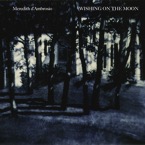 Wishing on the Moon
Wishing on the MoonMeredith D’Ambrosio
Sunnyside
JazzTimes®
By Harvey Siders
December 2006
If any songwriter deserves the encomium “American original,” it’s Meredith d’Ambrosio. No slave to A-A-B-A or 32-measure tunes, she has always followed her own muse. Her inspiration: intimate jazz, in the story telling style of Mabel Mercer. Meredith has a small range, but tons of wit, whimsy and wisdom. There’s no doubt she’s a bona fide jazz singer. Take the title tune: It sounds like a vocalese...like she added words to some instrumentalist’s 16-bar solo. Her phrasing is a paragon of clarity and economy. When her message is complete, Meredith ends it. No wasted words. “Have You Noticed?” and “I’d Do It All Over Again” are 24-bar tunes. The latter reveals her concerns for construction: The verse, referring to a warm-up, is written in the form of exercise scales, and in order to make “all again” rhyme with “in vain,” she ever-so-slightly bends “again” into a-gayn. That track ends with near-subliminal scatting from d’Ambrosio…all too short. While most tunes seem truncated, “Angels Without Their Wings” is 34 measures to accommodate the title as an afterthought. Adding humor to unrequited love, in “Melodious Funk,” she seemed close to substituting “Thelonious Monk” for the title. Kudos to pianist Cecilia Coleman for her sensitive comping, and trumpeter/flugelhornist Don Sickler for his eloquent gap-filling.
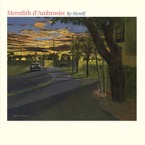 By Myself
By MyselfMeredith d'Ambrosio
Sunnyside
JazzTimes®
By Christopher Loudon
April 24, 2012
How appropriate that Meredith d’Ambrosio devote an entire album to the music of Arthur Schwartz, for neither has ever received anywhere near the appreciation they deserve. Just as Schwartz (who, for the record, never won an Oscar and received only two nominations, despite decades of masterful film work) should be exalted alongside Berlin, Porter, Rodgers and Kern, d’Ambrosio can stand toe-to-toe with pretty much any jazz singer of the past half-century. Perhaps, for d’Ambrosio, it’s the result of her perennially understated style. She has, very much akin to Mabel Mercer, always maintained a less-is-more approach, a hushed elegance that gently propels each song like a paper boat across a still pond. Indeed, to stretch the analogy, her treatments suggest origami—delicate yet complex and filled with masterfully imaginative touches.
Throughout this 14-track set, the quietude is even more pronounced. For the first time since her sophomore album, 1981’s Another Time, it is d’Ambrosio on her own, singing and playing. Though she has always dismissed her piano skills as merely serviceable, there are strong echoes of both Bill Evans and her one-time recording mate Fred Hersch. As for the playlist, d’Ambrosio paints a full, vivid portrait of Schwartz, blending sublime hits (“Dancing in the Dark,” “I Guess I’ll Have to Change My Plan,” “You and the Night and the Music”) with such splendid rarities as “Once Upon a Long Ago,” “Why Go Anywhere at All?” and “High and Low.”


